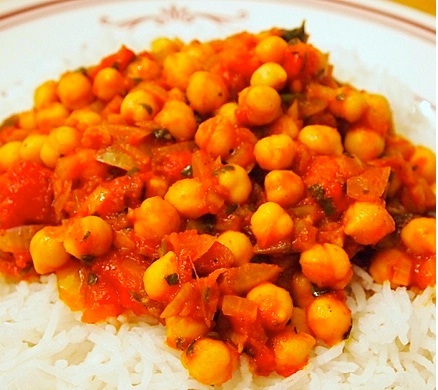A common misconception about the vegetarian diet is that it is difficult for vegetarians to consume enough protein to be healthy. Vegetarians are often subjected to constant questions about how they could possibly have sufficient protein in their diet without meat. In fact there are plenty of excellent sources of protein other than meat and fish. The key to maintaining a healthy body on a vegetarian diet is to have a variety of protein sources everyday and to include at least one protein rich food with each meal.
Protein is essential to keeping us healthy and performs important functions in the body, such as cell renewal and muscle growth. However the situation is made a little more complex because not all proteins are as “complete” as each other. This means that certain proteins contain fewer essential amino acids than others, and we need all of them to be healthy. Generally plant proteins are less complete than animal proteins, and therefore vegetarians need to combine several types of protein in their daily eating routine. Soya is the most complex plant protein and as such should be incorporated into every vegetarian’s diet. Here is a run down of the best sources of protein for vegetarians:
Protein Sources:
Whole Grains: All whole grains are a good source of protein, however the greatest protein rich whole grain of all is quinoa. Quinoa is one of a small number of vegetarian foods that is a complete protein, containing all the essential amino acids. Quinoa was a staple food in the diet of the ancient Incas, who named it the “mother grain”. Other whole grains such as brown rice and barley are also relatively good protein sources.
Lentils and Beans: Lentils and beans are an excellent, affordable protein source. Lentils themselves contain a huge 18 grams of protein in an average serving. They are also an incredibly versatile food and can be used in many different recipes to suit all tastes. Consider using lentils in an Indian dahl, kidney beans in a vegetarian chilli or a delicious chickpea hummus. Soybeans are easily the ultimate protein source for vegetarians and vegans alike. They are used to make tofu, soymilk and tempeh. Tempeh itself contains 41 grams of protein in a single serving, which fulfils your daily protein requirement in one go! Often if you buy processed soy, such as tofu or milk, it will have added vitamins and iron, which vegetarians are also sometimes short of.
Eggs: Eggs are a good source of protein for vegetarians because they are animal proteins and therefore contain all of the essential amino acids. Eggs are also an excellent source of vitamin A and vitamin B12. At one point there was a recommended limit on how many eggs a person should eat per week, as eggs contain cholesterol. However this limit has been lifted since scientific research has revealed that the level of cholesterol will have no effect on our health. However the yolk of the egg contains most of the cholesterol, so if you have concerns then eating just the egg whites will still provide you with the protein. Nuts and Seeds Nuts and seeds are a good source of protein and excellent as a snack on the go. Peanut butter is particularly convenient and a good way of getting protein into the diet of vegetarian children. Almonds and peanuts contain a high level of protein, with 8 grams per serving. However nuts and seeds are high in fat so they should be eaten in moderation. Protein is easily incorporated into every meal of the day. For example, you could try scrambled eggs on toast for breakfast, a peanut butter sandwich for lunch and a vegetable curry for dinner.
Here is an excellent high-Protein Chickpea curry for you to try at home: High-Protein Chickpea Curry – Serves – 2 Cooking time – 30 minutes
Ingredients
- 1 tbsp oil
- 1 Onion, chopped
- 1 garlic clove, chopped
- ½ tsp salt
- ½ tsp cumin powder
- ¼ tsp turmeric powder
- ¼ tsp red chilli powder
- 1 tomato, chopped
- 400g/14 oz can chickpeas
- 5cm piece root ginger, grated
- fresh coriander
- Pinch of Garam masala
- Basmati rice
- Naan Bread
Instructions: Begin by heating the oil or butter in a deep saucepan. Once hot fry the onions and garlic until nicely caramelized. Now add the salt, the spices and the root ginger, allow to cook for around a minute. Next add in the tomato and cook for a few minutes until soft. Now add ¼ cup of water and mix. Then pour in the chickpeas, stirring and mashing some of the chickpeas whilst they cook. Cover and simmer for five minutes. Finally add the ginger, garam masala and coriander and cook for a further minute. Serve with basmati and/or naan bread.

